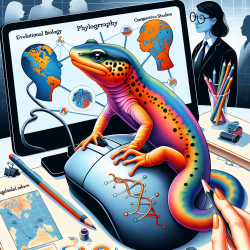Embracing Evolution: Insights from Asian Newts to Enhance Online Therapy Practices

In the journey of a special education practitioner, continuous learning and adaptation are crucial. The fascinating findings from the research article "Comparative multi-locus assessment of modern Asian newts (Cynops, Paramesotriton, and Pachytriton: Salamandridae) in southern China suggests a shared biogeographic history" provide profound insights that can be applied to enhance your online therapy practices.
Understanding the Research
The study investigated the shared biogeographic patterns among three genera of Asian newts in southern China. Using multi-locus genetic data and environmental data, researchers discovered that these newts exhibit a common basal split corresponding to geographic terrains, likely influenced by paleoclimatic fluctuations during the Miocene epoch.
Key Takeaways for Practitioners
This research highlights the importance of understanding and adapting to environmental influences, which can be translated into several practical strategies for online therapy:
- Embrace Diversity: Just as newts adapt to different terrains, recognize and respect the diverse backgrounds and needs of your students. Tailor your therapy approaches to fit their unique circumstances.
- Use Data-Driven Decisions: The study utilized comprehensive genetic and environmental data. Similarly, gather and analyze data on your students' progress to make informed decisions about their therapy plans.
- Adaptability is Key: The newts' ability to thrive in various conditions underscores the importance of flexibility. Be prepared to adjust your methods based on what works best for each student.
Encouraging Further Research
The intricate biogeographic history of these newts underscores the value of continuous research. As practitioners, staying updated with the latest studies can provide new tools and methods to improve your practice. Consider exploring comparative studies in education to understand the broader patterns and factors influencing student success.
Implementing the Insights
To effectively integrate these insights into your practice, consider the following steps:
- Professional Development: Participate in workshops and courses that focus on data-driven therapy techniques.
- Collaboration: Work with colleagues to share insights and strategies that are effective in diverse environments.
- Reflective Practice: Regularly review and reflect on your therapy sessions to identify areas for improvement and adaptation.
By embracing the lessons from the natural world and continuously striving for improvement, you can enhance your online therapy services and better support your students' growth and development.To read the original research paper, please follow this link:
Comparative multi-locus assessment of modern Asian newts (Cynops, Paramesotriton, and Pachytriton: Salamandridae) in southern China suggests a shared biogeographic history.
Citation: Yuan, Z.-Y., Wu, Y.-K., Yan, F., Murphy, R. W., Papenfuss, T. J., Wake, D. B., & Zhang, Y.-P. (2022). Comparative multi-locus assessment of modern Asian newts (Cynops, Paramesotriton, and Pachytriton: Salamandridae) in southern China suggests a shared biogeographic history. Zoological Research, 43(5), 706-718. https://doi.org/10.24272/j.issn.2095-8137.2022.080










